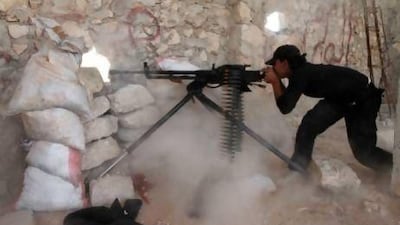Istanbul // Rebel commanders yesterday called for urgent supplies of sophisticated anti-tank and anti-aircraft weapons to save Syria's largest city from regime forces after the United States announced it would supply arms to the opposition.
Troops loyal to President Bashar Al Assad, backed by Hizbollah militants, have been massing near the northern city of Aleppo, Syria's commercial capital, after taking control of Qusayr last week.
A major assault on the city, dubbed "northern storm" by pro-regime media, has been widely anticipated. Regime troops attacked rebel held suburbs of Aleppo and Homs yesterday, as they seek to capitalise on recent military gains.
Those advances appear to have played a major role in prompting the US decision to directly arm rebels. Washington announced late on Thursday that it would supply weapons to the rebels after it concluded that the Assad regime has used chemical weapons, including the nerve agent sarin, on a small scale against the opposition. But it remains unclear exactly what munitions the US would supply to the rebels.
"Now we are looking for the next step, we wait now for weapons and ammunition, we are now in most need for quality weapons especially anti-tank and anti-aircraft missiles," General Salim Idriss, head of the rebel Supreme Military Council, told the BBC World Service yesterday.
"After what happened in Qusayr the regime is preparing for a very big offensive in Aleppo and suburbs, we are in most need for anti-tank and anti-aircraft missiles and in addition we are in need of a huge amount of weapons and ammunition to be able to stop the offensive of the regime," he said.
With the Syrian uprising now into its third year, and with more than 93,000 people killed according to the latest UN count, Gen Idriss rejected suggestions putting more weapons into Syria would worsen the bloodshed, saying rebels needed "effective tools" to defend civilians from regime assaults.
"If we have to wait the situation on the ground will be very dangerous, now the fighters on the ground can't wait because they don't have enough weapons and ammunition to fight against the regime, and maybe what happened in Qusayr can be repeated in Aleppo and we don't like to see that happening again," he said.
With the right weapons, rebels would defeat regime forces, Gen Idriss said.
Unconfirmed reports yesterday suggested some heavy weapons were already en route to rebels, while Gen Idriss was reportedly due to travel to Washington soon for talks with US officials.
UN leader Ban Ki-moon said yesterday that arming either side in the Syria conflict "would not be helpful". Mr Ban told reporters he has been "consistently clear that providing arms to either side would not address this current situation. There is no such military solution."
US President Barack Obama is to meet leaders of leading industrial nations, including Russia, France and the UK at this week's G8 summit, with Syria expected to be on the agenda. Paris and London have both said they are considering arming rebel groups.
"We want anti-tank and anti-aircraft weapons," George Sabra, acting leader of the opposition Syrian National Coalition, told Al Arabiya television.
"We expect to see positive results and genuine military support," he said.
The Syrian authorities issued a sharp rebuke to the US decision, and the assessment by US intelligence agencies that regime forces had used nerve gas, saying it was looking for a pretext to intervene in the conflict.
In a statement yesterday, the Syrian foreign ministry said US claims about chemical weapons use were "full of lies" and "based on fabricated information".
Syria's main backers, Tehran and Moscow also criticised the decision.
Yuri Ushakov, a foreign affairs adviser to Russian president Vladimir Putin, sad the information provided by US officials "didn't look convincing."
Alexey Pushkov, chairman of Russia's parliamentary foreign affairs committee, was more blunt.
"The data on Assad's use of chemical weapons were faked in the same place as the lie about (Saddam) Hussein's weapons of mass destruction," he wrote on his Twitter account, referring to American intelligence claims about weapons of mass destruction in Iraq - later proved to be false.
Iran's ambassador to Syria, Mohammad Sheibani, said the US decision to arm rebels would undermine any hopes for peace, ahead of the proposed 'Geneva 2' negotiations
"Does the opposition need weapons that it already has? These weapons have destroyed the country, there is no use for armaments it is a destruction of Syria and causes pain for Syrian people," he said.
Russia has openly supplied weapons to Mr Al Assad's forces, including advanced anti-ship cruise missiles. Iran has trained pro-regime militia fighters, and supplied weapons and cash to prop up the Assad regime, much of it shipped by air over neighbouring Iraq, according to US intelligence assessments.
Hizbollah, the Lebanese Shiite militant group, which follow's Iranian supreme leader Ali Khamanei, has also been heavily involved in combat against rebels in Syria, with its presence apparently playing a decisive role in recent regime victories, most notably in the town of Qusayr.
"Before Qusayr is the same as after Qusayr. Nothing has changed," Hizbollah leader Hassan Nasrallah said in a televised speech yesterday. "Where we need to be, we will be ... We will continue to assume our responsibilities."
psands@thenational.ae
With additional reporting by Agence France-Presse

